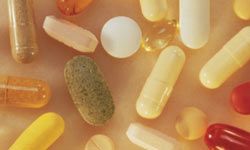Living, working, playing and exercising in a hot and humid environment isn't easy. Some people prefer it to the opposite -- bitter-cold climates -- but if it were ideal for round-the-clock living then, well, air conditioning would've never been invented.
When the temperature is high and the humidity makes it feel even hotter, your body has to work harder. Your heart rate goes up, you sweat out water and essential minerals, your blood becomes thicker and, as a result, you burn more calories. That's great if you want to lose weight, but in order to avoid the dangerous side effects of exerting yourself in uncomfortable conditions, you have to provide your body with supplements. (Plus, it's the rest and recovery process after exertion that truly makes your body better than it was before.) Supplementation plays an important role in giving your body the necessary fuel to regenerate itself.
Advertisement
Before we take a look at the best supplements for less-than-ideal outdoor conditions, understand that these dietary items don't need to be taken separately. If, for example, you had a different set of pills or drinks for each of the supplements listed, you'd look like a pharmacist taking his work home with him. Many of these supplements appear together in various food products and drinks.
Now, step outside the cool comfort of your home and discover the supplements you need on the pages ahead.
